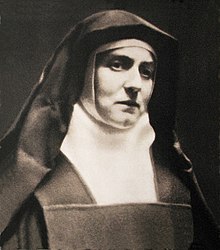
Back إديت شتاين Arabic اديت شتاين ARZ ادیت اشتاین AZB Едит Щайн Bulgarian Edith Stein Catalan Edith Stein CEB Terezie Benedikta od Kříže Czech Edith Stein Danish Edith Stein German Έντιτ Στάιν Greek
Teresa Benedicta of the Cross | |
|---|---|
 Teresa Benedicta of the Cross in 1938–39 | |
| Born | 12 October 1891 |
| Died | 9 August 1942 (aged 50) |
| Cause of death | Execution by poisonous gas |
| Nationality | German |
| Education | Schlesische Friedrich-Wilhelms-Universität University of Göttingen University of Freiburg (PhD, 1916) |
| Notable work |
|
| Era | 20th-century philosophy |
| Region | Western philosophy |
| School | Continental philosophy Phenomenology Thomism Carmelite spirituality |
| Institutions | University of Freiburg (1916–1918) |
| Thesis | Das Einfühlungsproblem in seiner historischen Entwicklung und in phänomenologischer Betrachtung (The Empathy Problem as it Developed Historically and Considered Phenomenologically) (1916) |
| Doctoral advisor | Edmund Husserl |
Main interests | Metaphysics, phenomenology, philosophy of mind and epistemology |
Notable ideas |
|
Edith Stein OCD (in religion Teresa Benedicta of the Cross; 12 October 1891 – 9 August 1942) was a German Jewish philosopher who converted to Catholicism and became a Discalced Carmelite nun. Edith Stein was murdered in the gas chamber at Birkenau on 9 August 1942, and is canonized as a martyr and saint of the Catholic Church; she is also one of six patron saints of Europe.
Stein was born into an observant Jewish family, but had become an agnostic by her teenage years.[5] Moved by the tragedies of World War I, in 1915, she took lessons to become a nursing assistant and worked in an infectious diseases hospital. After completing her doctoral thesis at the University of Freiburg in 1916, she obtained an assistantship there to Edmund Husserl.[6]
From reading the life of the reformer of the Carmelites, Teresa of Ávila,[7] Stein was drawn to the Christian faith. She was baptized on 1 January 1922 into the Catholic Church. At that point, she wanted to become a Discalced Carmelite nun but was dissuaded by her spiritual mentor, the archabbot of Beuron, Raphael Walzer OSB. She then taught at a Jewish school of education in Speyer. As a result of the requirement of an "Aryan certificate" for civil servants promulgated by the Nazi government in April 1933 as part of its Law for the Restoration of the Professional Civil Service, she had to quit her teaching position. Edith Stein was admitted as a student to the study of religion to the Discalced Carmelite monastery in Cologne on 25 November, on the first vespers of the feast of Saint Teresa of Ávila, and received the religious habit as a novice in April 1934, taking the religious name Teresia Benedicta a Cruce (Teresia in remembrance of Teresa of Ávila, Benedicta in honour of Benedict of Nursia). She made her temporary vows on 21 April 1935, and her perpetual vows on 21 April 1938.
The same year, Teresa Benedicta a Cruce and her biological sister Rosa, by then also a convert and an extern (tertiary of the order, who would handle the community's needs outside the monastery), were sent to the Carmelite monastery in Echt, Netherlands, for their safety. In response to the pastoral letter from the Dutch bishops on 26 July 1942, in which they made the treatment of the Jews by the Nazis a central theme, all baptized Catholics of Jewish origin (according to police reports, 244 people) were arrested by the Gestapo on the following Sunday, 2 August 1942. They were sent to the Auschwitz concentration camp, and were murdered in the Birkenau gas chambers on 9 August 1942.
- ^ a b Ferreira, Danilo Souza (2018). "EMPATHY: An intellectual history of Edith Stein 1891–1942". Academia.edu. Instituto de Ciências Humanas e Sociais/UFOP. Retrieved 11 August 2022.
- ^ "Edith Stein" at EWTN.com.
- ^ "The Science of the Cross (CWES, vol. 6)". ICS Publications.
- ^ Oben, Freda Mary (2001). The Life and Thought of St. Edith Stein. Alba House. ISBN 9780818908460.
John Paul II. In his philosophical work, he clearly shows the influence of Edith Stein
- ^ "Teresa Benedict of the Cross Edith Stein (1891-1942) - biography". www.vatican.va. Retrieved 14 March 2024.
- ^ Stein, Edith (1964). On the problem of empathy. Internet Archive. The Hague, M. Nijhoff.
- ^ Teresa de Ávila, Libro de la vida